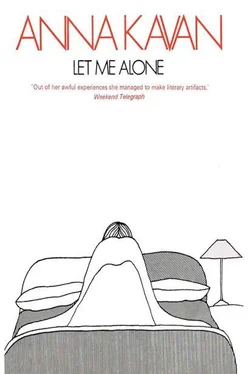Anna would not join in the games. Only tennis she played, and played rather well, with a quick, erratic vigour of movement. It amused her to dash about the smooth court, swooping noiselessly on her rubber-soled shoes, lifting her arms with a sudden swoop upwards or down, violently, then careering on. She liked the sharp, clean, stinging, singing sound when the ball was well hit, squarely, in the middle of the racquet; and the strong forward drive of the stiffened arm from the shoulder; and the sharp, dry, downward jerks. It was amusing. But only for a little while. She soon tired of the game, and got lazy and bored and wanted to wander off somewhere else.
She was a good player, though, on the whole, and so she was chosen to play in a tournament that was being held in the village. Six girls from the school were to play. It was rather an honour to be chosen.
Anna knew that the others didn’t want her to play; they didn’t want her to have the honour. It was their queer, school-boy code that compelled them to choose her ‘for the good of the school.’ She rather jeered at it in her heart, seeing all the smooth young faces set so stonily against her.
‘For goodness’ sake play up this afternoon,’ the games captain said to her. ‘Don’t get slack and lazy as you generally do. Show a little sporting spirit for once — if you can.’
She frowned angrily at Anna, irritated because she didn’t want her to play at all, really. But Anna smiled back, quite unconcerned, with an aggravating little air of superiority which she had acquired of late. As much as to say: ‘Of course I shan’t trouble to reply to your childish remarks. You are much too foolish a person to be taken seriously.’ Sporting spirit indeed!
Halfway through the afternoon, Rachel appeared in the stand to watch the tennis for a little while. Anna, who was winning at that moment, saw her, and waved her racquet smilingly.
It was a breach of etiquette. The stern sporting laws required that every player should be absorbed in the game, utterly, to the exclusion of any other thought. To take notice of onlookers was a crime.
Rachel felt the chilly weight of condemnation lowered upon Anna. A strange, silent emanation of disapproval, silent hostility, so foolish, yet so profound. All the girls watching, the young, foolish figures in their flannel blazers, looking at each other quickly with angry eyes, and quiet, deep, scornful disapproval. A certain unanimous condemnation in the normal hearts, a certain instinct of rejection in the embryo little women. Their condemnation was so foolish and unimportant. But at the same time, all normality was on their side, the good manners, the clean clothes and bodies, the orderly ways of life, all that immense structure of conventional mediocrity which runs the world, so fearsome and so powerful. The impulse of their disapproval was the impulse of the world’s hate. The spontaneous rejection by mediocrity of the exceptional; the horrible, world-determination to keep the norm, to reduce everything to an average dead-level, and destroy the exceptions.
Rachel looked at Anna vigorously swinging her racquet and running about the court: such a fine, graceful figure, moving so swift and as it seemed lonely in the sunlit space, with a peculiar quick beauty of physical being, and inside a strangeness, a profound, inevitable, hopeless isolation that was fatal to her and must destroy her.
And Rachel could not bear to think of her destruction. She could not bear to sit there watching that sunlit, youthful figure whom she loved, and to feel the destructive effluence, the silent, relentless hostility which came from those foolish girls whose hearts were the cruel, normal, mediocre hearts of the mediocre world.
She got up and went away, back to her study, and sat down by the open window. She pondered her own love for Anna. Was she harming her, perhaps? Did she do wrong in keeping her so much to herself, away from the other girls, intensifying her singularity?
Who knows? But her love constrained her, and her love was very potent. She wanted to keep Anna to herself. There was nothing to be done.
Anna enjoyed herself and played better than the others. At the end of the afternoon, feeling sore, they all went off together and left her alone. She didn’t mind this in the least. She was used to it. And she wasn’t interested in the girls or their opinions. Their friendship would have bored her just as much as their animosity; it was all part of the same stupid, childish dreariness.
She went into the pavilion to change her shoes and put her racquet away. Here was another girl.
‘You and I seem to have been rather pointedly abandoned,’ she said to Anna, smiling with a hidden shyness.
‘Yes,’ said Anna, looking at her.
Sidney Reeve was about her own age, strong, dark, with short curly hair like a boy. Her eyes were bright, quick, with a glassy clearness almost amber-coloured, like the eyes of an animal. There was altogether a rather animal suggestion about her pointed face, but pleasant, the face of a very intelligent and sensitive animal. She was certainly no fool. And the irregularities of her face were rather pleasing: the curious slant of her black eyebrows, and the upward lift of her mouth. It gave her an air of detachment, as though she watched everything with a quizzical, slightly mocking expression.
‘How is it you’re not with the others?’ Anna was moved to ask.
‘You haven’t got quite the monopoly of unpopularity,’ Sidney answered, with the flicker of a one-sided smile.
There was something sharp and cool, refreshing about her. Anna was interested. Sidney could smile with keen young real amusement, and a spice of cynicism.
‘Come up to the village and have tea with me,’ Sidney suggested, suddenly, almost as if giving an order.
Her manner was perfectly assured; assertive even: but underneath was a sensitive shyness, a hint of deprecation.
‘Very well,’ Anna agreed.
They walked up the road together. Anna was slightly taller, more graceful altogether, more delicate. Sidney, with her cropped curly head and her short white tunic swinging over her sturdy knees, was like some foreign soldier youth. She moved with a steady buoyancy, but with just a trace of swagger, of conscious challenge. She was bold too: she led the way into the room where the other girls who had played in the tournament were sitting at tea with their friends, celebrating the occasion. The girls disliked her. A self-conscious movement of distaste passed over the youthful faces, a sneering look, an instinctive withdrawal. There were whispered comments ‘Sidney Reeve! Anna-Marie!’
Sidney strode on into the room, making for a corner table, taking no notice of anyone. She might have been miles away from any criticism; but all the time, Anna could tell that she was extremely, even painfully aware of the hostile faces, and yet somehow glorying in the situation.
They sat down and ordered their tea.
‘Did you enjoy the tennis?’ Sidney asked.
‘Yes, it was fun,’ said Anna.
‘But you’re not very interested in games, are you?’
‘No. I think they’re a waste of time. Pointless and boring.’
‘More boring than other things?’
‘Well — yes!’ said Anna, smiling.
Sidney too smiled. She spoke in a low, deep, rather gruff, rather stiff voice, but very intent, and her intelligent eyes rested upon Anna with a certain intensity. She was somewhat repressed by her surroundings, by the consciousness of the inimical faces in the background and her determination to be unaware of them. But there was a sort of urgency in her behaviour. She was trying to make some contact with Anna.
Anna liked her. She was interested and stimulated.
‘Why haven’t we known each other before?’ she asked.
Читать дальше












